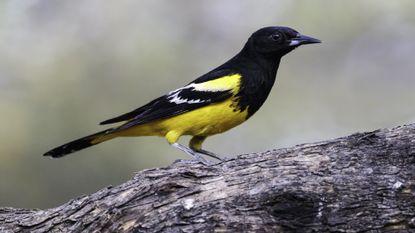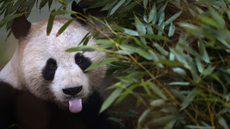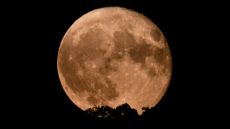Birds won't be named after humans anymore in an effort to eliminate racist links
A number of North American bird species are currently named after historically racist figures


North American bird species that are named after humans are being renamed in an effort to eliminate ties to racist figures, the American Ornithological Society announced Wednesday.
In a statement, the Ornithological Society, which is responsible for the naming of bird species across the continent, said it "commits to changing all English-language names of birds within its geographic jurisdiction that are named directly after people." Toward that end, the society said, it's "establishing a new committee to oversee the assignment of all English common names for species."
Dozens of birds across North America are currently named for humans, and many of those people are historical figures with ties to racism and slavery. "There is power in a name, and some English bird names have associations with the past that continue to be exclusionary and harmful today," Ornithological Society President Colleen Handel said. Anywhere from 70 to 80 bird species will be renamed.
Subscribe to The Week
Escape your echo chamber. Get the facts behind the news, plus analysis from multiple perspectives.

Sign up for The Week's Free Newsletters
From our morning news briefing to a weekly Good News Newsletter, get the best of The Week delivered directly to your inbox.
From our morning news briefing to a weekly Good News Newsletter, get the best of The Week delivered directly to your inbox.
The push to strip human names from bird species began in 2020 with the thick-billed longspur. At the time, the bird was called the McCown's longspur, named "after an individual with strong ties to the Confederacy and who is perceived today by many as a symbol of slavery and racism," the Ornithological Society said. The effort expanded after the society considered a public petition urging a change from racially charged names. Deciding which names fit that criteria proved fraught, so the society decided to scrap all human-linked names.
That means an end to the Audubon's shearwater, a species named after John James Audubon, a famous ornithologist who "also enslaved people and held white supremacist views," his namesake Audubon Society notes. Also on the way out is the Scott's oriole, named for General Winfield Scott, who "oversaw the forced relocation of Indigenous peoples in 1838 that eventually became the Trail of Tears," The New York Times reported.

Continue reading for free
We hope you're enjoying The Week's refreshingly open-minded journalism.
Subscribed to The Week? Register your account with the same email as your subscription.
Sign up to our 10 Things You Need to Know Today newsletter
A free daily digest of the biggest news stories of the day - and the best features from our website
Justin Klawans has worked as a staff writer at The Week since 2022. He began his career covering local news before joining Newsweek as a breaking news reporter, where he wrote about politics, national and global affairs, business, crime, sports, film, television and other Hollywood news. Justin has also freelanced for outlets including Collider and United Press International.
-
 Today's political cartoons - December 2, 2023
Today's political cartoons - December 2, 2023Cartoons Saturday's cartoons - governors go Gotham, A.I. goes to the office party, and more
By The Week US Published
-
 10 things you need to know today: December 2, 2023
10 things you need to know today: December 2, 2023Daily Briefing Death toll climbs in Gaza as airstrikes intensify, George Santos expelled from the House of Representatives, and more
By Justin Klawans, The Week US Published
-
 5 hilarious cartoons about the George Santos expulsion vote
5 hilarious cartoons about the George Santos expulsion voteCartoons Artists take on Santa versus Santos, his X account, and more
By The Week US Published
-
 Scotland bids farewell to giant pandas
Scotland bids farewell to giant pandasSpeed Read Animals soon to begin journey back to China as loan agreement comes to an end
By Julia O'Driscoll, The Week UK Published
-
 Cigarette-style warning labels on meat could cut consumption, say scientists
Cigarette-style warning labels on meat could cut consumption, say scientistsSpeed Read The UK's national food strategy aims to cut meat consumption by 30% by 2032
By Sorcha Bradley, The Week UK Published
-
 Young teen wins top science prize for soap that can treat skin cancer
Young teen wins top science prize for soap that can treat skin cancerSpeed Read Memory of Ethiopian workers out in the sun inspired US schoolboy to make cell-reviving soap
By Keumars Afifi-Sabet, The Week UK Published
-
 The moon is older than we thought
The moon is older than we thoughtSpeed Read New data adds 40 million years to the satellite's age
By Devika Rao, The Week US Published
-
 New study suggests hitting the snooze button may be no bad thing
New study suggests hitting the snooze button may be no bad thingSpeed Read People who delay getting up perform better in some cognitive tests, research finds
By Arion McNicoll, The Week UK Published
-
 Yes, satellites could fall from the sky
Yes, satellites could fall from the skySpeed Read Debris from thousands of satellites could cause injuries
By Devika Rao, The Week US Published
-
 Russian lunar spacecraft crashes into the moon
Russian lunar spacecraft crashes into the moonSpeed Read
By Justin Klawans Published
-
 Hurricane Hilary bringing unprecedented storm warnings to Southwest
Hurricane Hilary bringing unprecedented storm warnings to SouthwestSpeed Read
By Justin Klawans Published










